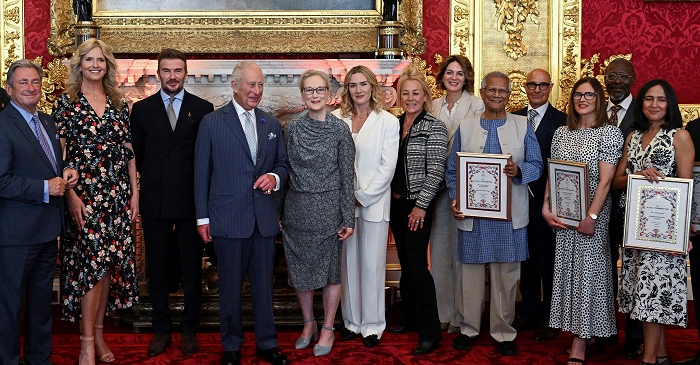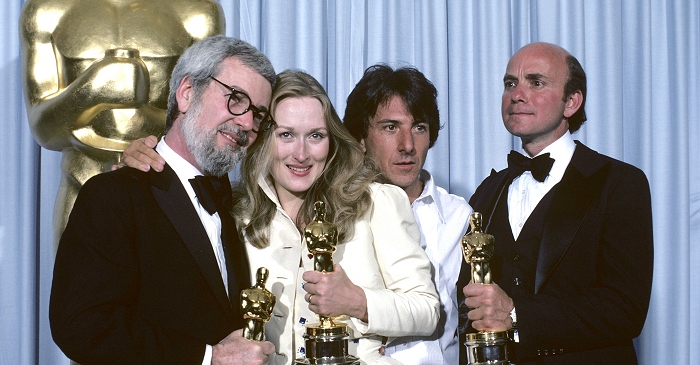|
Simply Streep is your premiere online resource on Meryl Streep's work on film, television and in the theatre - a career that has won her acclaim to be one of the world's greatest living actresses. Created in 1999, Simply Streep has built an extensive collection over the past 25 years to discover Miss Streep's body of work through thousands of photographs, articles and video clips. Enjoy your stay and check back soon.
|
|
Will Meryl make Oscar history?
The Telegraph ·
March 2003
· Written by John Hiscock
|
‘Oh, please, don’t talk to me about that,” says Meryl Streep. The subject of the Academy Awards has come up and she’s feeling uncomfortable. “That part of the business is horse-racing; the other is acting, and that’s my interest.”
It is the time of year, however, when awards dominate conver-sations in the film business; and one of the most-discussed topics is how, after a three-year absence from the screen, Streep, who ties with Katharine Hepburn for the most Oscar acting nominations (both have 12), may very well make history this year. She has won twice before – for Kramer vs Kramer and Sophie’s Choice – and her current performances, in Stephen Daldry’s The Hours and Spike Jonze’s Adaptation, are being touted to land her best actress and best supporting actress nominations respectively next week, as they did at the Golden Globes, where she won for Adaptation. Not that she cares about votes and voters. “I find it alarming that all the campaigning for Oscars is getting like a political campaign,” she says. “It is really distasteful. It won’t be long before they start paying for television commercials for best picture, best actor and all those things.” At the age of 53, Meryl Streep is probably the greatest film actress of our time, having starred in such memorable films as The Deer Hunter, The French Lieutenant’s Woman, A Cry in the Dark and Silkwood. She likes to say that nobody has ever asked about making a sequel to any of her films or posed the question, “Can we merchandise this?” And that is particularly true of The Hours and Adaptation.
“I’m just sort of stunned that two such really wonderful opportunities came within a year of each other,” she says, as we talk in a New York hotel room. “You don’t get scripts as well written or as ambitious as those two films and I can’t really explain it. Is it because we’re more serious now, or is it just because the business itself confounds the people that fund it and they can’t predict what will work so we get a chance to do these odd projects? “I mean, Adaptation is not something a major studio would have picked up five years ago. It just wouldn’t have happened. But something is in the air and I can’t help thinking it’s a good thing. It’s been good for me this year,” she says, laughing. In The Hours, which has a screenplay by David Hare based on Michael Cunningham’s novel, she plays Clarissa, a woman planning a party for an ex-lover who is wasting away from Aids. Her co-stars are Julianne Moore and Nicole Kidman, both of whom are also being tipped for Oscar nominations.
“I admired the book but never thought they could make it into a movie because it seemed to exist in such an interior sort of world,” she says. “But it was a beautiful script.” In the wildly different Adaptation, also based on a book, The Orchid Thief, she plays real-life author Susan Orleans in the offbeat script by Charlie Kaufman, who ended up writing himself into the story as a way out of his writer’s block. “I just loved its ambition, the way it succeeded in being hot and cool at the same time,” she says. “It was funny, sad and accurate.” Meryl Streep has an infectiously naughty laugh, is totally unpretentious and seems refreshingly normal. She has not been seen on screen since Music of the Heart in 1999 because, she explains, she has been busy with her family. She and her husband of 24 years, sculptor Don Gummer, have four children: Henry (22), Mary (19), Grace (16) and Louisa (11). They have homes in Connecticut and Manhattan – where they live most of the time – and she also cares for her 93-year-old father, who was recently widowed and lives in Brooklyn.
The environmentally-conscious actress shuttles between the homes in her electrically-powered Toyota Prius, which she bought to replace her Audi and which she is eager to talk about. “I loved my Audi, it cost $60,000 and it got 20 miles to the gallon. I bought a Prius and it gets 51 miles to the gallon in the city, it seats five and has a fabulous sound system. If every person in America who has two cars would make one of them a Prius then we wouldn’t need troops in Saudi Arabia because we wouldn’t have to guard oil fields and we wouldn’t have to prop up a regime that is horribly repressive and we’d all be happy.” She pauses for breath and laughs apologetically. “I don’t want to sound too simplistic but we really can do much, much better for our air.” Meryl Streep is equally outspoken on topics ranging from the banning of pesticides to the need to improve the status of women in the world. Nearer home, she has constantly campaigned for better scripts and better roles for women, something she is pleased to see finally materialising.
“The whole film industry is changing,” she says. “It is now less easy to predict what is going to be a hit, which makes for more opportunity for different kinds of films to make it to the market place.” One that is currently before the cameras after a 10-year gestation period is Angels in America, in which she stars and which she describes as one of the most ambitious projects she’s ever been involved in. Based on Tony Kushner’s plays Angels in America and Perestroika, the project will be shown on cable television in America as a six-part mini-series and Streep will play four roles.
“I’ve always liked to dive in to new experiences,” she says. “I only want to take things that are challenging and that get me off my laurels or whatever I’m sitting on.” Despite her solid theatrical background and 30 films, Streep is finding that acting does not get any easier. “I don’t feel that I’m hauling a huge train of experience behind me,” she says. “I feel like everything’s new each time I go out. My insecurity grows with time and I feel less sure of what it is that makes something work.
“I feel more excited each time I begin, but less sure about what will make it successful than I did when I was 27. And that’s probably a good thing.”










